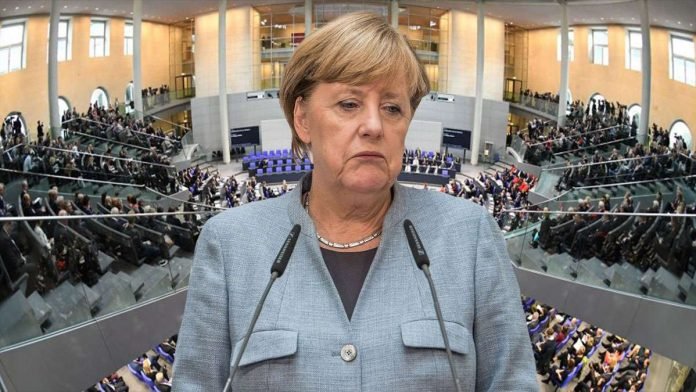Germany’s rise of the Greens anti-Semitism and the Far right.
German Chancellor Angela Merkel has been conspicuously quiet in recent weeks. She rarely gives interviews as it is, let alone to foreign media. Now, though, she has sat down with CNN’s Christiane Amanpour.
In case you were wondering: Angela Merkel is still chancellor of Germany. In fact, if all goes to plan and the grand coalition of her Christian Democrats (CDU), their Bavarian sister party, the Christian Social Union (CSU), and the Social Democrats (SPD) doesn’t implode prematurely, her tenure is set to run until 2021, when the country goes to parliamentary polls.
Never one to hog the limelight, at least not overtly, she has over the past few weeks been conspicuous by her absence and apparent reluctance to step in and get involved in day-to-day politics, preferring to leave that in the hands of her successor as party leader and heir apparent as chancellor, Annegret Kramp–Karrenbauer.
Now, however, Merkel has broken her silence and given a wide-ranging interview to CNN’s Christiane Amanpour, discussing everything from the European elections to the renewed rise of anti-Semitism in Germany.
Growing populism
While acknowledging and welcoming the fact that more people voted in the elections for the European Parliament last week than had five years ago, Merkel warned that Germany must be vigilant in the face of nationalist and populist movements that are increasingly garnering mainstream support across the EU. “In Germany, obviously, they always have to be seen in a certain context, in the context of our past, which means we have to be that much more vigilant than others.”
The rise of nationalism and racism, Merkel said, is a worrying development and all the more reason to bolster democratic institutions and values. “[That’s] why we are for democracy, why we try to bring about solutions, why we always have to put ourselves in the other person’s shoes, why we stand up against intolerance, why we show no tolerance toward violations of human rights.”
On an election-related note, she conceded that her party and like-minded center-right parties across the European Union had failed to address issues that are important and dear to young voters, such as climate policy.
The German Green Party doubles EU election
With a double-digit score across Europe’s biggest countries including a stunning 20 percent in Germany, the Greens bagged record gains in European elections on Sunday with younger voters leading calls for action to halt global warming.
In France, the Greens was set to win 12-12.7 percent of the EU vote, up from 8.9 percent in 2014. Likewise in Austria, Ireland and the Netherlands, the environmental party were on course to garner more than 10 percent.
With the two main traditional EU blocs – the conservative EPP and the centre left Social Democrats projected to lose ground, the Greens could end up as kingmakers in the European Parliament.
The remarkable EU-wide surge of the Greens, who completely owned the issues of climate change, environmental protection and animal welfare, appears to have left a mark on Merkel, who served as environment minister under Chancellor Helmut Kohl and has been dubbed the “climate chancellor” because of the support she has expressed for clean energy initiatives.
The Greens’ success, she said, is a “challenge for us to find even better answers and solutions to these issues. Above all, we have to to drive home the point that we will stick to the objectives we have set ourselves.”
Increase in anti-Semitism
Merkel used the interview to air her concerns about the rise of anti-Semitism, saying Germany “always had a certain number of anti-Semites among us, unfortunately.”
The government’s anti-Semitism commissioner, Felix Klein, recently caused a stir for saying he “cannot recommend to Jews that they wear the skullcap at all times everywhere in Germany.”
Merkel also condemned the fact that “there is to this day not a single synagogue, a single day care center for Jewish children, not a single school for Jewish children that does not need to be guarded by German policemen.” She conceded that “unfortunately, over the years we have not been able to deal with this satisfactorily.”
The issues Merkel addresses in the interview are clearly dear to her heart. Detractors may argue that the timing of the interview is not a coincidence and that she’s chosen it carefully as a sleight of hand to distract from her coalition’s myriad problems, especially the disconnect with voters who have flocked to the Greens or the far-right Alternative for Germany.
Whatever her motives may be, she has at least dispelled rumours of a premature demise as chancellor.
Support Independent Journalism Today
Our unwavering dedication is to provide you with unbiased news, diverse perspectives, and insightful opinions. We're on a mission to ensure that those in positions of power are held accountable for their actions, but we can't do it alone. Labour Heartlands is primarily funded by me, Paul Knaggs, and by the generous contributions of readers like you. Your donations keep us going and help us uphold the principles of independent journalism. Join us in our quest for truth, transparency, and accountability – donate today and be a part of our mission!
Like everyone else, we're facing challenges, and we need your help to stay online and continue providing crucial journalism. Every contribution, no matter how small, goes a long way in helping us thrive. By becoming one of our donors, you become a vital part of our mission to uncover the truth and uphold the values of democracy.
While we maintain our independence from political affiliations, we stand united against corruption, injustice, and the erosion of free speech, truth, and democracy. We believe in the power of accurate information in a democracy, and we consider facts non-negotiable.
Your support, no matter the amount, can make a significant impact. Together, we can make a difference and continue our journey toward a more informed and just society.
Thank you for supporting Labour Heartlands









